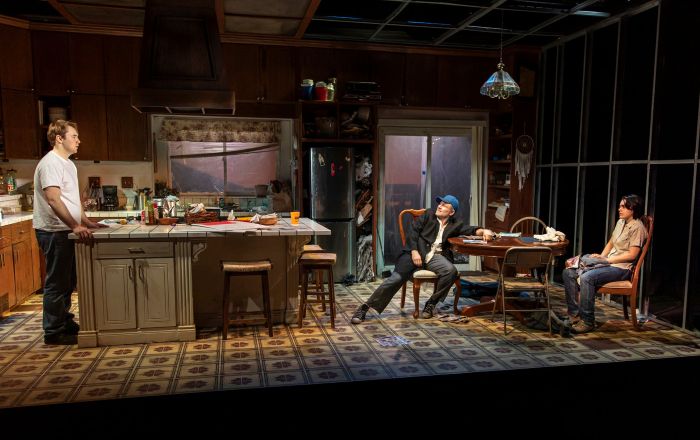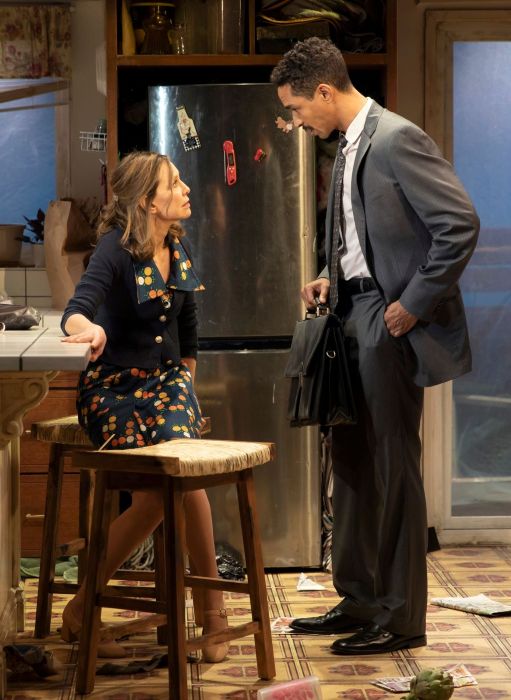For the second production of its 30th anniversary season, The New Group is presenting a limited Off-Broadway engagement of Pulitzer Prize winner Sam Shepard’s 1977 three-act OBIE Award-winning play Curse of the Starving Class at The Pershing Square Signature Center, where it was last produced in NYC more than two decades ago. Set in the messy kitchen of a dilapidated farmhouse in rural California owned by the unstable Tate family, with an empty refrigerator, a broken door and window, and mounds of trash outside and in, the dark comedy, under the direction of Scott Elliott (the company’s Founding Artistic Director), puts the emphasis on dark, in its devastating portrayal of socio-economic strife, familial dysfunction, and a miserable stagnated existence, with pointed references to our classist capitalist country and the failure of the American dream for people on the fringes of society, who pass their misery on to the next generation.

Each of the four Tates has a dream of how to improve their wretched situation and enjoy some happiness, but none of them is in agreement about what to do, so the constant in-fighting and lack of communication builds. Wife and mother Ella has plans to sell the house, then move to Europe and start a new life. Daughter Emma imagines earning a living wage and respect in Mexico by becoming a professional mechanic. Son Wesley, who works the farm, does some cleaning in the house, and tries to maintain the property, has visions of staying there and turning it into a viable moneymaking operation. But unbeknownst to all of them, Weston, their neglectful alcoholic husband and father, deeply in debt, has already signed an agreement of sale for a fraction of its worth to pay off one of his many creditors. When the word gets out, and the new owner Ellis arrives with the contract and cash, it sets off a maelstrom that doesn’t end well for any of them.
In Shepard’s signature style, the metaphor-laden story (inspired in part by memories of his own troubled childhood) interweaves poetic passages of direct-address reflections by the characters with extremely bleak and sometimes laughable enactments of their angry and ferocious interactions and reckless, self-destructive, self-sabotaging behavior. We see Wesley (played by Cooper Hoffman) urinating on his sister’s 4H project on the kitchen floor and later walking into the room fully undressed in front of his family after a shower; Weston (Christian Slater) staggering and stumbling into the house and passing out on the table, covered with piles of his dirty laundry, after a few days and nights of incessant drinking (then becomes sober and responsible when it’s far too late); Ella (Calista Flockhart) heaving the artichokes he bought (the only things he brought home to feed his hungry family) out of the fridge and across the kitchen; and Emma (Stella Marcus) storming out of the house with her mother’s car keys (once again, after first trying to escape on their horse, which only dragged her through the mud) to get away from it all and move on to a life of crime (the only thing that pays well). All the outrageous over-the-top conduct is ridiculous, but more often tragic than funny, and injected with pathos by Elliott and his cast.

There are also humorous segments of Ella – who first appears in the kitchen in an oversized bathrobe and hair curlers, with no make-up, taking pills, bending over, and drinking water directly out of the sink’s faucet to swallow them – warning her teenage daughter about menstruation; recurrent episodes of her and the others opening their empty refrigerator, talking into it, then forcefully and repeatedly slamming the door in frustration; hopeful but ultimately sad scenes of Ella all dressed up, made up, and flirtatious for her extended meeting with the smooth-talking lawyer/developer/speculator Taylor (Kyle Beltran), who, it turns out, has a past connection with her husband that surfaces and brings an end to her expectations; and hilarious, then threatening scenes with the terrific Jeb Kreager in the dual roles of Ellis – assuming a heavy redneck accent and demeanor, and bullying his way around the kitchen as the new owner of the property, who cut a deal with Weston for a mere pittance to alleviate some of his debt – and later as the mysterious Emerson, who ends the story with a bang. He is joined by David Anzuelo as Sergeant Malcolm, a local police officer who comes to tell the Tates that Emma has been arrested for shooting up the Alibi Club, owned by Ellis and frequented by Weston (but refuses to take any action against Taylor and Ellis for their swindling of the Tates, in Shepard’s acerbic jab at derelict law enforcement), and as Slater, who accompanies Emerson in the final blow-up.

And stealing the show and the hearts of the audience is the farm’s maggot-infested sheep (played by the irresistible Lois, from Vidbel Animal Actors), brought into the kitchen by Wesley, and later by Weston, who talks to her, pets, and cuddles her, as she looks around, makes direct eye contact with members of the audience, responds to Slater by turning her head towards him (at the performance I attended, drawing “aaahhhs” and laughs from both the house and the actor), and serves as another symbol of the decaying ill-fated family (as in the didactic story he tells her of a doomed eagle and cat).
Arnulfo Maldonado’s set, with props by Jackson Berkley, creates the look of the Tates’ rundown kitchen, its disordered contents, and unclean area outside (though the suspended vent hood at the center of the room seems a little upscale for the financially strapped farm). Costumes by Catherine Zuber effectively indicate the status and personalities of the characters and their transitions (in the case of Weston and Ella, from slovenly to clean and neat, and in the case of Wesley, to recognizing his inescapable heritage by donning the dirty discarded clothes of his father). Lighting by Jeff Croiter (with spotlights that add a touch of the surreal to the figures’ direct-address ruminations) and sound by Leah Gelpe accentuate the explosive tone of the story’s climax, and fight direction by Sean F. Griffin (UnkleDave’s Fight-House) takes the characters’ constant arguing and yelling to the next level, of violent physicality.
While The New Group’s production of Curse of the Starving Class has its moments of the darkest kind of humor, it is in essence a tragic look at a desperate nuclear family that is failed by society and, above all, has failed themselves and each other, as with the innocent sheep.
Running Time: Approximately two hours and 45 minutes, including an intermission.

Curse of the Starving Class plays through Sunday, April 6, 2025, at The New Group, performing at The Pershing Square Signature Center, The Romulus Linney Courtyard Theater, 480 West 42nd Street, NYC. For tickets (priced at $38-119, including fees), go online.



